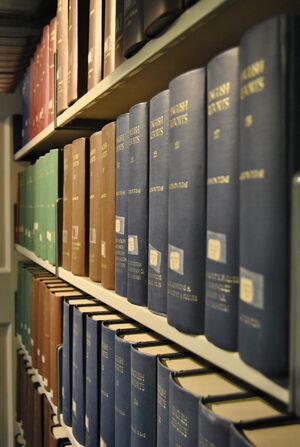Don't Forget Your Raw Law

If I were to be completely honest about it, I’d say that I went through at least a third of my undergraduate law degree in virtual ignorance of the one thing you would expect a law student to know quite a bit about: case law. I didn’t really know how to find case law. When I did find it, I didn’t really know how to use it. I certainly didn’t know where it came from (or rather, I didn’t know where the law reports I was required to read came from).
Now, I’m not one of those people who studied law before the Internet-age. In fact, I studied law slap-bang in the middle of the Internet-age. As a student, I had access to all the Westlaws and LexisNexis’ you could shake your lecture notes at. I had it very easy and maybe that was the problem. I couldn’t find an actual printed law report on a library shelf. I couldn’t really tell where the headnote ended and where the judgment began. I didn’t even know what a ‘headnote’ was.
So, I’m going to take my admission that I knew squiddly-dit about law reports a step further and humbly suggest that this particular sphere of ignorance has grown larger since I was a law student. For all their virtues (and, the virtues are many), the big online law databases suffer from one critical vice: they encourage you to forget that your law library exists and extends beyond the four-corners of your computer’s monitor.
At the beginning of my second year I stumbled upon an excellent little book called Learning the Law by a chap called Glanville Williams. My copy of this gem was printed in 1982 – well before Sonic the Hedgehog, Craig David and The Artful Dodger, and of course, access to this thing we call the Internet.
Glanville Williams

Professor Williams said some sensible stuff in Learning the Law and no matter how out-of-date my copy is, there’s plenty in there which still rings true today. Williams said,
- He who want to become a lawyer and not merely to pass law examinations (which is not at all the same thing), must learn to use legal materials, and must acquire the habit of first-hand work among what lawyers call the sources.
He went on,
- The great disadvantage of confining oneself to textbooks and lecture notes [or Google and Wikipedia] is that it means taking all of one’s law at second hand. The law of England is contained in statutes and judicial decisions; what the text writer thinks is not, in itself, law. [my emphasis].
Professor Williams, if I understood him correctly, was essentially making two very important points. The first point is that in order to really understand the law, you actually need to read the law – you’ve got to get to grips with the primary sources. The second, and related point, is that the lawyer’s real skill isn’t about holding all of the law in one’s head -- that’s impossible. The real skill is about knowing how to find the law.
Anyone who has been shown how can bash the name of a case into a search box on a database – there’s no magic in that. But, I think that the student who can work with the online databases and the hardcopy sources is onto something good. For any student with designs on practising as a barrister or solicitor, the primary sources will be the tools of your trade. And, just because you are lucky enough to go to a university with every legal search engine under the sun, that might not necessarily be the case when you get into chambers or a firm.
In perfect harmony?
Hardcopy and online resources can and should sit in harmony with each other. But, if you can’t use the former you’re no better than a chef who can only drive a microwave.
This all sounds a bit preachy, I know. There is always a place on a law degree for textbooks, casebooks, online summaries and abstracts. But, there is also a place, on a law degree, for the law itself. So, if you don’t know your ‘WLR’ from your ‘All ER’, or your ‘AC’ from your ‘Cr App R’, get into the library and sort it out. Your studies, I can guarantee, will be all the better for it.
If you want to get more of an insight into the history of law reporting read Daniel's piece on The Curious Case of the Judgment Enhancers.
Daniel Hoadley is a Barrister and Law Reporter at the ICLR.He also took his BPTC at The City Law School.